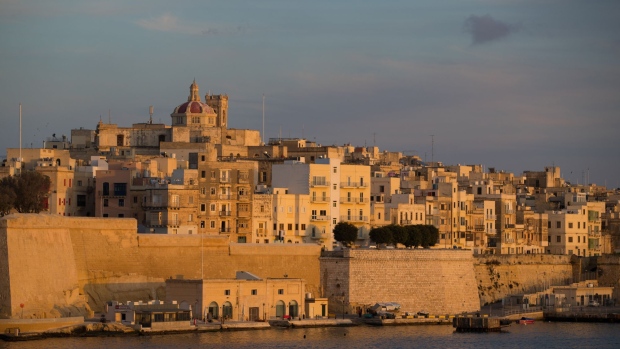Dec 6, 2019
Murder Scandal Shatters Postcard Image of a European Island
, Bloomberg News

(Bloomberg) -- Maltese Prime Minister Joseph Muscat can’t leave his house these days without running the risk of being pelted by eggs and coins. Once celebrated for creating one of the European Union’s fastest-growing economies, he’s now the target of a nation’s anger over corruption.
Two years after the brutal murder of journalist Daphne Caruana Galizia, who peeled back layer upon layer of rot at the highest levels of government, the tiny Mediterranean island of fewer than 500,000 people is still convulsing.When the police probe into the car bomb that took her life escalated last month, thousands turned out in the streets of the old walled capital of Valletta chanting her name. The scandal then reached Muscat’s inner circle and he resigned. Muscat, 45, denies any involvement and said he will step down next month. But demonstrators are demanding he goes immediately because they don’t trust him.
“Daphne is a heroine,” said Dante Bondin, 73, a retired schoolteacher. “It’s not that she was right but that she is right. All the things happening now show that what she said has become true.”
Until Caruana Galizia’s death, Malta was known more for its rugged coast, beaches and crystal clear lagoons than the corruption and cronyism her reporting exposed. That postcard image has been shattered as protesters burn candles in front of her portrait next to flowers and excerpts from her writings at a memorial to an ancient siege outside the Cathedral. When street cleaners remove the mementos, new ones appear.
Malta, about 100 kilometers (63 miles) south of Sicily, hasn’t seen such political and social turmoil in the 55 years since its independence from Britain, and many are left wondering if it will ever recover.
One state official who declined to be named said that foreign investors are turning away from finance and infrastructure projects because they don’t want to be linked to the country. Public tenders are getting few bids because firms believe the deals are sewn up.
“This is all giving Malta a bad name,” said Emma, 19, a bank employee. She declined to be identified by her full name because of the sensitivities in the country over the scandal. “The economy is doing great, but it could get hurt because there’s no trust in the government.”
It’s a challenge for EU leaders, too. Already grappling with the undermining of democratic institutions in Hungary and Poland, they now have to worry about drawing new red lines as the bloc’s tiniest member brings into sharp focus yet another breakdown in the rule of law. Like those countries, Malta joined the EU in 2004.
Over recent years, Malta went from a sleepy holiday destination to an international hub for gambling and artificial intelligence and cryptocurrency.
It was the dark underbelly of that transformation that Caruana Galizia wanted to expose. Her anti-corruption blog Running Commentary denouncing ministers, lawmakers and business figures was so popular that over a million readers followed it.
“There are crooks everywhere you look now. The situation is desperate,” she wrote in a post one afternoon in October 2017. Minutes later, she was killed in a powerful explosion as she drove away from the her home. Three men were charged with her murder, but the mastermind of the mafia-style killing was still at large.
Late last month, there was finally breakthrough. Police arrested Yorgen Fenech, the owner of a company in Dubai called Black 17, which Caruana Galizia wrote about before her death alleging it was linked to Maltese politicians.
Cabinet minister Konrad Mizzi and Keith Schembri, the chief of staff, have resigned and deny wrongdoing. The economy minister briefly suspended himself.
Police say the investigation is ongoing, and that they’re getting help from Europol. At first Muscat remained detached from developments. Then he said he’d step down once his party chooses a successor in a process starting Jan. 12.
But for many, including Caruana Galizia’s oldest son, Matthew, it isn’t enough. A modern day crusader on the island ruled for centuries by the Knights of Malta, Matthew says the family has filed a judicial appeal to keep Muscat away from the probe. If that works, Malta will be closer than ever to finding out the truth, he said.
“He has to step down now,” says Matthew, 33, who was a journalist like his mother before quitting his job to try to find her killers. “The risk of him interfering in the investigation is too great.”
In a court reply to the family’s suit, Muscat said he hasn’t interfered in the investigation and that its progress confirms state institutions are independent.
Privately, he projects optimism. The premier told his staff earlier this week not to worry about him, that he was looking forward to a new life and spending weekends with his twin children, according to an official who was present. The person, who declined to be named because it was a confidential meeting, also said Muscat didn’t announce he’d resign because of “any form of suspicion” and has long insisted no premier should serve more than two terms.
“We need to be united and look at the systemic risks, at what has led politicians and influential people to think they are above the law,” said Roberta Metsola, a member of the European Parliament for Malta’s opposition Nationalist Party. “I don't think we can answer that question until Muscat quits and we can draw a line under this sorry mess.”
To contact the author of this story: John Follain in Rome at jfollain2@bloomberg.net
To contact the editor responsible for this story: Caroline Alexander at calexander1@bloomberg.net, Rodney Jefferson
©2019 Bloomberg L.P.





